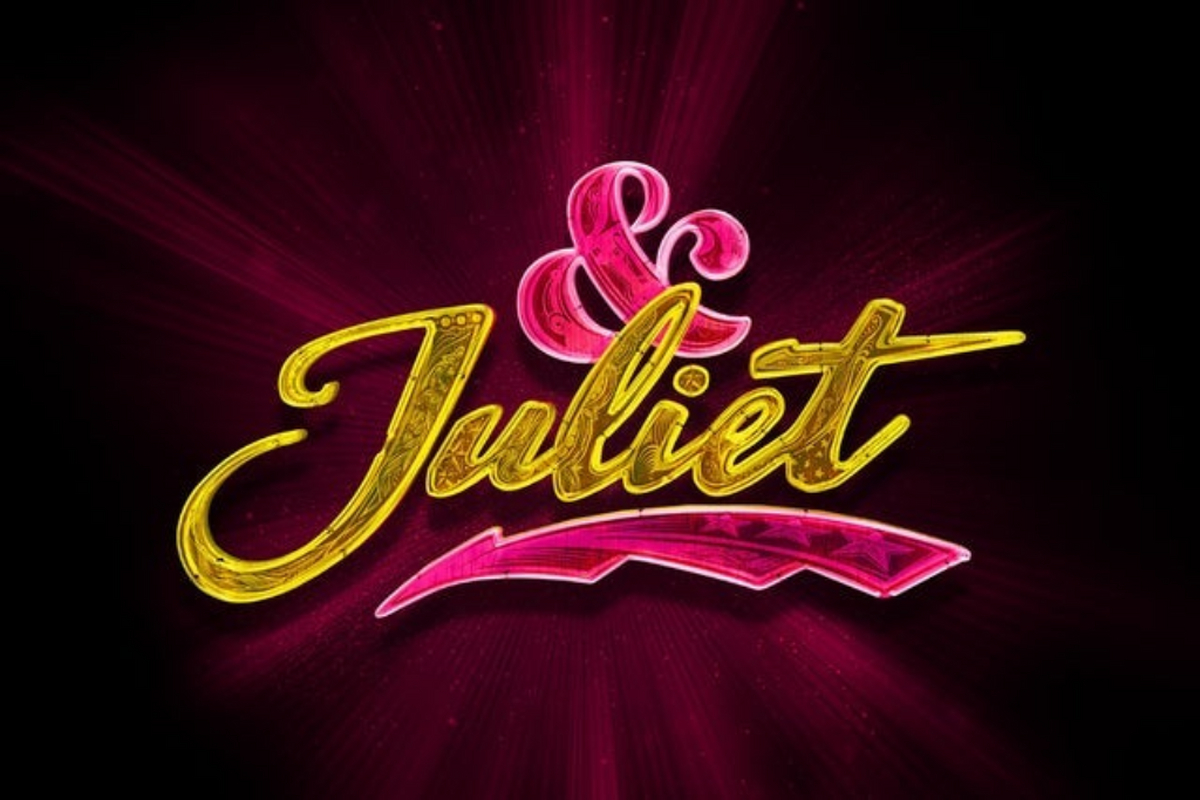Review: & JULIET at Belk Theater
& JULIET Flips the Tragedy With a Gender Free-for-All
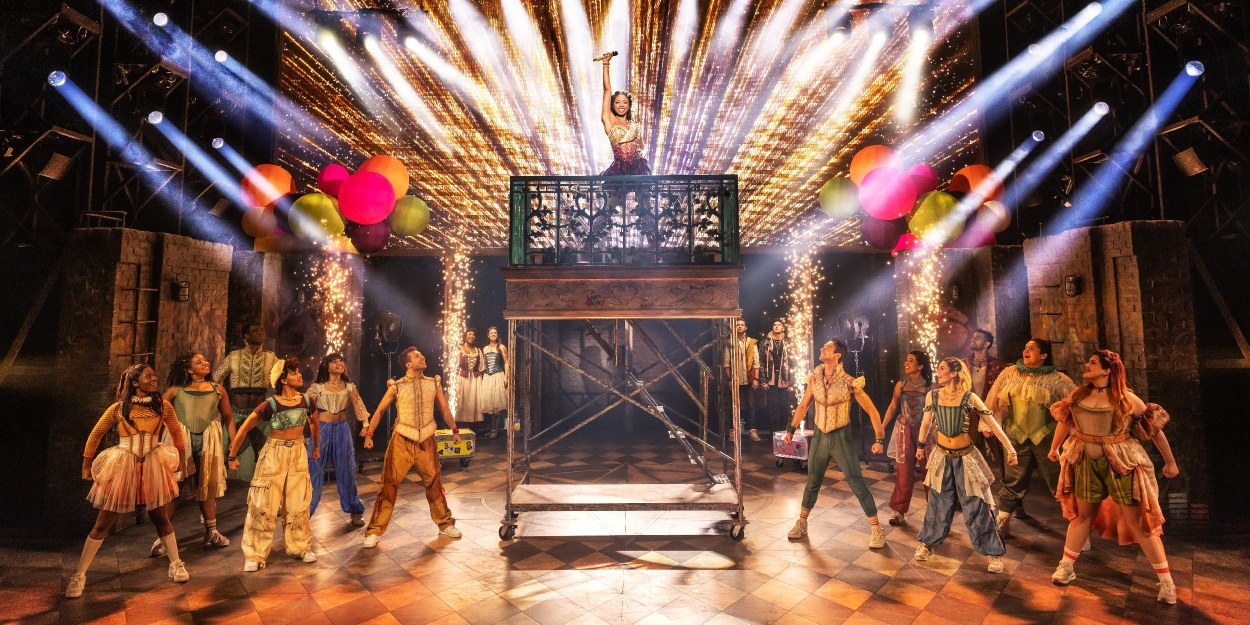
You can rightfully say that when composer/lyricist Max Martin and scriptwriter David West Read (of Schitt's Creek fame) chopped Romeo off of Shakespeare’s most beloved and romantic tragedy, & Juliet became a very different story. Among the missing at Belk Theater, where the national tour of the Broadway hit town earlier this week are murders, duels, and poisonings. After Scene 1, you’ll never see even a brick of Verona. If you haven’t grasped the new tilt of the title, it’s female-dominated, with a non-binary spice from beginning to end.
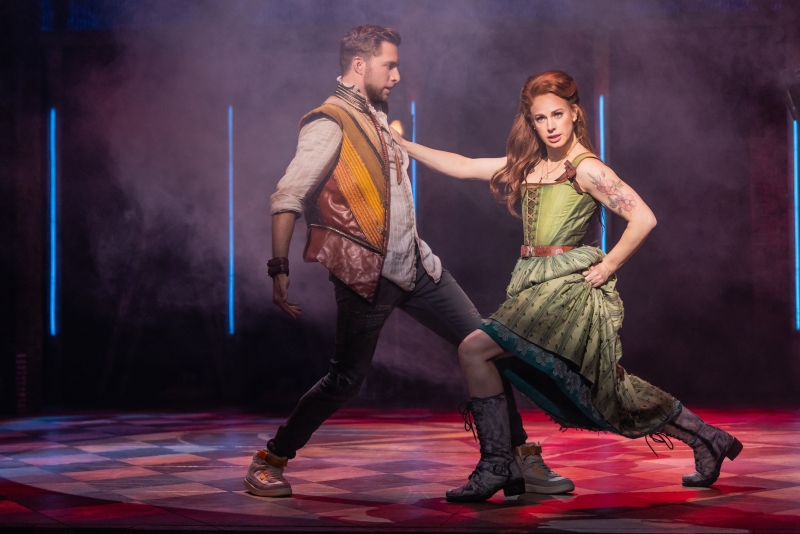
That’s not at all surprising for a jukebox musical collecting Martin’s biggest hits – if you’re aware that the Swedish composer’s twenty-seven #1 hits, second only to Sir Paul McCartney, were largely written for Taylor Swift, Britney Spears, Jessie J, Kelly Clarkson, Katy Perry, Pink, and other female supernovae. Recent #1 hits, recorded after the & Juliet playlist was codified in 2018, have mostly spotlighted Ariana Grande.
Although Read’s book is often labelled as a sequel to Shakespeare’s classic, it can be more accurately described as a fantastical live rewrite. Time is rather fluid once the houselights are dimmed, for we seem to be in London rather than Verona – anticipating the world premiere of Romeo & Juliet in 1594. Joining the Bard in his anticipation is his wife, Anne Hathaway Shakespeare, who thinks her husband’s ending is a bit of a downer.
Why should Juliet ape Romeo’s melodramatic impulsiveness after he has committed suicide? Even Shakespeare has told us that Juliet’s ex was unstable, maybe a little unhinged. Let her wake up, grieve a little, and get on with her life!
.jpg)
Turns out that Will, yielding to Anne’s prodding, doesn’t simply tweak the ending, where Juliet, finding out that Romeo hasn’t left her with sufficient poison – a more user-friendly method of offing yourself – does the job on herself with a ready-to-hand dagger. No, this is a total rewrite, with Will discarding all the action that has gone before and beginning with the final churchyard scene.
We likely know all that preceded Juliet’s waking and can empathize with her. Londoners in 1594, if we care about them, would be seriously disoriented. Well, that’s their problem.
But are we still in 1594 when Shakespeare completes his total rewrite? It doesn’t seem to be ready by nightfall, by the end of the year, by the end of the century, or during the Bard’s actual lifetime. Thanks to the eye-popping hybrid costumes designed by Paloma Young, a mashup of mod, glitter, and Elizabethan styles; Andrzej Goulding’s imaginative video and projection designs; a few confetti cannons; and that jukebox planted stage right in Soutra Gilmour’s scenic design; we can rest assured that Shakespeare and Anne have had centuries to mull over their modifications.
Two kinds of ignorance converged at the Belk on opening night in Charlotte. Aside from Spears’ “Oops! … I Did It Again,” which I knew by title rather than melody, every entry on the songlist was new to me – and to my wife Sue, and, I suspect, to hordes of others in the house. Then there’s the younger generation, the ones screaming all the time: we can presume they do not to know that Romeo & Juliet was likely Shakespeare’s first non-historical tragedy and that he wouldn’t be writing Macbeth until he had written 16 or 17 plays in-between.
Hell, we can’t be absolutely sure that Read read R&J before he so lovingly lampooned it. At one point, one of Juliet’s chums suggests that she find solace in Paris, her former betrothed. Well, Paris wert slain in the same churchyard scene as Romeo, just one soliloquy before our hero drank his poison.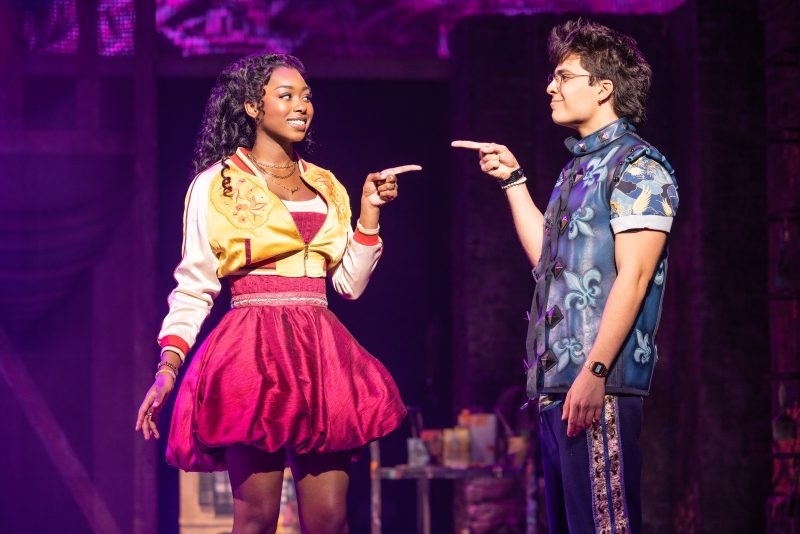
The good news is that both breeds in the audience can relax. My generation needn’t struggle to understand the lyrics of the 29 songs no matter how overmiked or unintelligible they might be. They are shoehorned into Read’s story rather than written for it. Nor do youngbloods, who little know nor care about Shakespeare’s life and oeuvre, need to worry about soaking up the info that Read dribbles out. Fake news, mostly.
With some showy lighting by Howard Hudson setting the glitz aglow, we can simply enjoy. Read tosses out plenty of feminist critiques and barbs in the marital clinches between Will and Anne, the puns and wordplay are delightfully sharp, and guess what? Besides reinventing his own Shakespeare and Anne as stage characters, he often wittily emulates the Bard. Yes, poetry!
Because of the prestige of the later tragedies, we often associate Shakespeare with blank verse. But in his early comedies and in Romeo & Juliet, rhymed couplets abound – most appropriately in this starlit romance. There’s even a sonnet from Romeo when things get hot. So you might try to notice – and then delight in – the many couplets and rhymes that are strewn along the way.
Director Luke Sheppard doesn’t have his cast hammering the rhymes, so they become a subtle connoisseur’s delight.
Somewhat capriciously – and very surprisingly – Anne adds a non-binary May to serve as Juliet’s bestie. Meanwhile, Juliet’s nurse gets a name, Angélique, which becomes very handy when the plot thickens. So instead of fleeing to her fiancé Paris, Read’s Juliet will embark on a journey to Paris, France. Anne, taking on the name of April, will join them in the show, completing the off-to-see-The-Wizard quartet. Will also wants to get in on the fun, so he writes himself in as their coachman, a Cinderella touch.
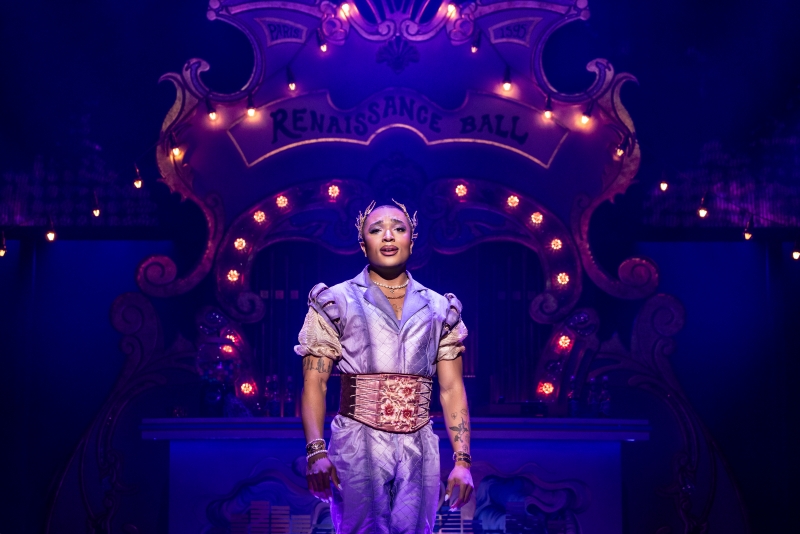
By the time they get there, the City of Lights already boasts an Eiffel Tower to greet them, so we’re definitely not in 1594 when we ride away from the opening scene. Free in France, the Shakespeares can add two more characters: François Du Bois, a shy new love interest for Juliet, and his domineering father, the manly Lance who must be convinced. “Oops!” is probably the best-fit song of the night when young Juliet accepts François’ proposal. François and May will complete a gender-bent triangle, so Juliet hardly realizes how drastically she has miscalculated.
All the singing is fairly fabulous, easily on a Broadway level even when brand names don’t deliver the songs. Rachel Simone Webb understudied the title role on Broadway and her power is dazzling here, no holding back and no falloff, though the words seemed to evaporate in her highest stratosphere. From a dramatic standpoint, she has way too much sass for her to be submissive to the elder Capulets, but this is not the type of musical where that ever matters. Show out, girl!
The Shakespeares have wonderful chemistry inside of Read’s script, taking their differences and their marital love beyond sitcom depth. As Will, Corey Mach demonstrates that he can be the reincarnation of the Superstar Shakespeare in Something’s Rotten before he mellows. Teal Wicks struck me as two Annes, to be honest, very real in her assorted jibes and dialogue, and a melodious, lyric-starved fog when she sang.
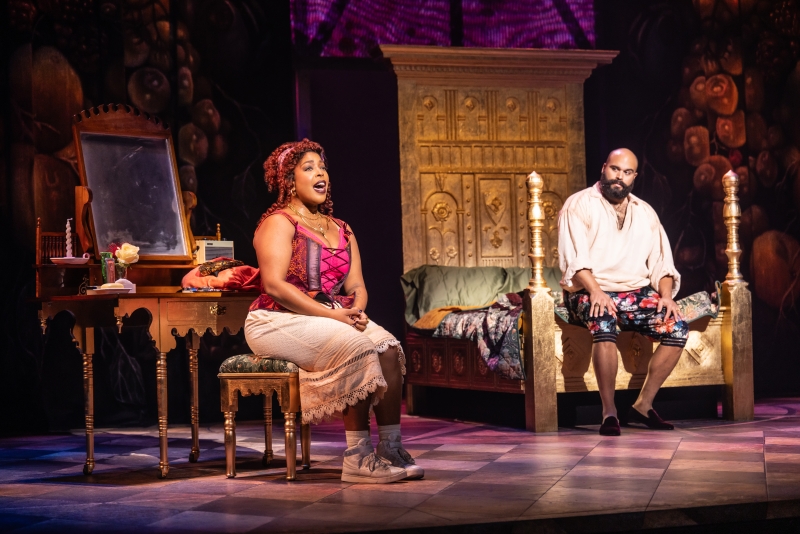
Both Nick Drake as May and Paul-Jordan Jansen are high-octane showstoppers when they get their chances. Each one of them belts a lyric that roused my suspicions. Drake as the non-binary draws a puzzling “I’m Not A Girl, Not Yet a Woman.” Almost as mystifying as the Spears hit there, when François finally comes out to Dad, Jansen must respond with the Backstreet Boys’ “Shape of My Heart.”
Lance, it turns out, is a long-lost love of Angélique, so the talents of Kathryn Allison get plenty of play. I can’t think of anybody I’d rather hear sing Pink’s “Fuckin’ Perfect” to Juliet when her spirits are down.


